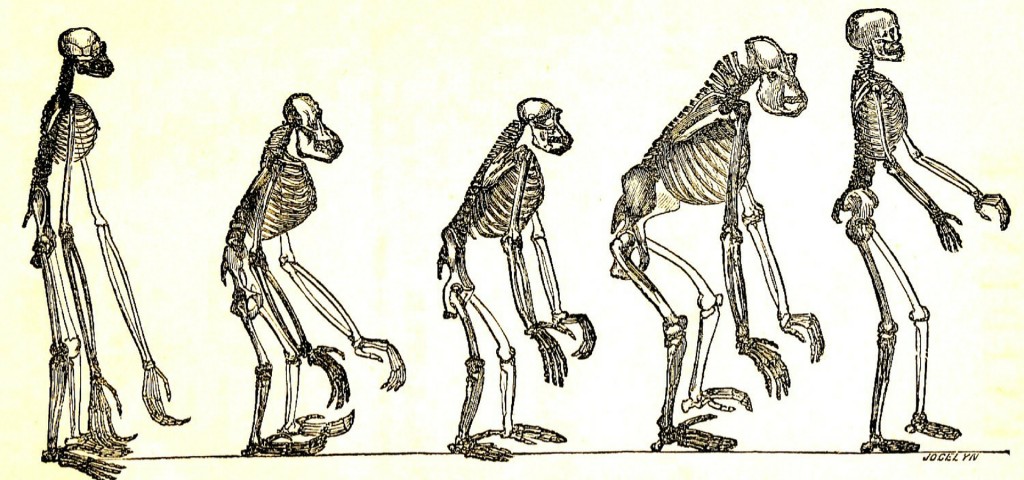Can evolution explain morality?
Recently, while reading The Magic of Reality (2012) by Richard Dawkins, I came upon this interesting proclamation in the chapter titled, “Why Do Bad Things Happen?”:
"Bad things happen because things happen. Whether they are bad or good from our point of view doesn’t influence how likely it is that they will happen. Some people find it hard to accept this. They’d prefer to think that sinners get their comeuppance, that virtue is rewarded. Unfortunately, the universe doesn’t care what people prefer."
So yes, as harsh as it sounds, the universe is indifferent to humankind. It is without emotion, has no sense of right and wrong, and is without the ability to be concerned for life. Let us, then, take this observation and apply it to how Darwin’s evolutionary theory possibly interacts with human morality. The question that puzzles my mind is, “How can natural selection and the raw materials of an indifferent universe be able to facilitate the evolution of human beings who do, in fact, have morals—or, at minimum, have a basic sense of right and wrong?”
But most true morals DO come from either protecting the species or living together in groups. Something evolution most definitely has a hand in as it promotes survival and reproduction for either the species or the individual.
"Do unto others as you would they do unto you". What better way to fit into a social group than the only real universally accepted moral?
"Do not kill". Retain the life of both individual and species - the root of evolutionary forces.
"Do not eat human flesh". Human flesh carries disease and parasites that pass to the person eating such meat, again saving lives.
"Protect the children". Again, saving the life of those that will one day reproduce.
Others, such as the sin of exposing specific bits of flesh, come from the human mind and are NOT evolutionary. But then they are not universal, either - they come from a handful of people wishing power over others. They are often contra-indicated by evolution, causing much death, but the species managed to survive anyway.I largely agree. Morality develops to protect social order. Laws build on morality when it is effective in maintaining that order.
That's it. And social order (for homo sapiens) promotes expansion of the species, which is exactly what evolution does.
Morality manifest as the golden rule, respect for life and prohibition of cannibalism produces tremendous social value and cooperation amongst homo sapiens yields wonderful results. This is an indisputable fact.
The only issue here is that is contrast to other biologically-favored & evolved traits, morality is something that can be easily rejected and frequently is. Humans, for instance, must honor their naturally-selected design and cannot reject water, sleep or food without resultant death. Morality violates this rule.I'm not aware of any morals, anywhere, that says you can't eat, sleep or drink. Can you expand on this?
What I was trying to explain is that from the perspective of evolution and the origin of life, everything has a physical, biological basis. So, for example, evolution dictates that human beings MUST eat and drink to survive. Because we have DNA that scripts how our biology works, no one can reject their design and autonomously decide that they won't consume nutrition because this violates how we are made.
Morality that has an evolutionary (and therefore a biological) basis violates this paradigm because people are free to reject moral principles as they wish. So, in one sense, our DNA and synapses in our brain (that are selected for) tell us, "Do this" while at the same time those same structures tell us, "Don't do it."Are they (free to reject morals)? Walk into your neighbors house and announce that you will now kill his children, then watch what happens.
Should a group or individual consistently violate common morals of their community they won't last too long, and are unlikely to reproduce, either. Of course, individuals can do just that, because evolution operates on the species as a whole, but it doesn't work very well most of the time.
An animal, for example, could be born with one short leg, making survival difficult but still surviving to produce more cows with one short leg. But sooner or later that strain will almost certainly die out, just as a group violating community morals will die out.
Of course we can reject that design. We'll die, but we can reject sleep, food and water if we so want. We can even reject the script of living altogether.
Morality can likewise be rejected - as can parenthood, socialization, family, work, entertainment. Outside of sleep, food and water, we can reject any of our biological tendencies without (necessarily) dying. Our chances of survival and of passing down our genes will decrease accordingly.
Good luck trying to willingly reject those scripts though - unless you have a particular sociopathic phenotype, you'll likely suffer. For most people it's not really a choice, even if they are "free" to do so from a biochemical perspective.Good point - we CAN reject most anything we wish to...as long as we're willing to pay the price. And as far as evolution goes that may well mean the end of our gene line.
I see your point yet I also wonder: the same morals that persuade protection of my herd also dictate that the murdering of not-my-herd works to my evolutionary advantage. Here, the same thrust for morality (gene preservation) animates divergent ethical behavior contingent upon perspective. That isn't a rebuttal but a point of reflection.
And indeed, if in fact morals at least partly originate from the human mind, then from an evolutionary standpoint, that morality lacks any real value if it subjective (not universal) and simply boils down to physical, biochemical phenomena (neurons firing in our brains). As you've stated, subjective morality does provide psychological comfort or justification to its subscribers.
Certainly, these analyses are limited to human beings because the animal kingdom by far has less structure and formalization of a system of morality.Again, I'm not aware of morals that say you should murder other tribes. Defend yourself against them, yes, but not murder.
How does it lack value? It improves your life, so that's of enormous value right there. But in addition, "value" in the sense you use it is a human defined concept with nothing to do with evolutionary forces, which is why it varies so much throughout the species.
Some animals have far MORE structure than most human communities. Those that live in herds often do, and many insects (ants, bees, etc.) always do. From evolutionary forces, whether we choose to label that structure "moral" or "instinct".There is family of morals that says the murder of other "tribes" is in fact a legitimate and just thing to do to protect group interests, but for me to elaborate would mean I would be dabbling into politics.
I will leave that to the political forums.Again, I've never heard of any "tribe" that believes that. Defense, yes, but not simple murder.
I vaguely recall a study or article describing the optimal strategy for individual, tribal and civilizational cooperation in the evolution of humanity. The optimal strategy was a presumption of non-aggression - we all play nice and get along unless someone initiates violence. The strategy is then to collaborate to destroy the person who violated the pact and betrayed the group.
Ah, here's a similar study: https://www.quantamagazine.org/20150212 … -question/
What's interesting is that one of the best strategies when there's random noise (as evolution in real life would have) is to be cooperative unless betrayed, but also to occasionally forgive betrayals. That seems to largely apply to humans as a whole.That sounds right to me. Cooperation will always yield rewards - 10 brains are etter than 1 - but when one attempts to destroy, promptly destroy them first. An eye for an eye is a very old concept.
In the study I linked above, 'turning the cheek' occasionally is a successful strategy.
On the other hand, turning the cheek for everything would be suicidal and a form of pathological altruism.Thank you, but no. If I think a negative action against me will be repeated I will most definitely not ask for more by turning a cheek.
How does evolution explain (the absence of morals of) Hitlerism? ... or racism?
A negative mutation? And what makes you claim that Hitler had no morals? Because they didn't match your own?
I didn't claim that Hitler had no morals?
Hitlerism, is the political policies of the Nazi Party of Germany from 1933 to 1945.
How does evolution explain Hitlerism? or racism?
(edited)Hitler wanted to stomp out all Jews, gays and atheists, that pretty unethical.
Generally people are good, Hitler was born and died a Catholic. Would you paint all Catholic as evil, even though Pope Benedict claim Hitler was an atheist? No.
All animals love, that is the Universal connection to all morals and ethics.There is no record of Hilter expressing his belief in any of the Christian tenets. He did express beliefs in tenets of Islam though, and there is evidence that Hilter became a Muslim.
The Catholic Catechism does express its approval of Muslims / Islam however.
Probably tribalism. Here's a decent explanation from Wiki: https://en.wikipedia.org/wiki/Tribalism
Socially, divisions between groups fosters specialized interactions with others, based on association: altruism (positive interactions with unrelated members), kin-selectivity (positive interactions with related members), and violence (negative interactions). Thus, groups with a strong sense of unity and identity can benefit from kin selection behavior such as common property and shared resources. The tendency of members to unite against an outside tribe and the ability to act violently and prejudicially against that outside tribe likely boosted the chances of survival in genocidal conflicts.
In Hitler's case, the outside tribe were Jews and non-Aryans.Aw, thank you, Mr. Popo. Tribalism ... and succession conflicts.
(It explains how aboriginal people have been persecuted and driven to near or complete extinction.)
I am reminded of Jesus' parable of the Good Samaritan who had compassion on the man (a Jew) who had been beaten, and helped him. The Samaritans (a part of the Palestinian people) and Jews were hateful enemies.
Where does such compassion come from? ... if not from a Creator?Evolution, just as being discussed here. It is a survival trait for the species if not the individual.
Years ago I was impressed upon, that I would go out of my way to have compassion for attractive people that needed help. That, I would not do the same for what I thought were ugly people. When I realized it was true, I was disgusted with myself, and asked God to fill me with compassion for the later as well. Since then, my walk has been to have compassion on the lovely and the unlovely as the Spirit leads. I am convinced that God filled me with His compassion.
Once your religious your already primed for authority over obedience.
Germany was a Christian nation even the nazi troops had :God is with us: on they belt buckle.
He won both Christain and Muslim, it would explain his hatred for gays Jews and atheists.To me it points out that Hilter was opportunistic of religion to control a society.
Get ready for a even greater attack than Hitler's. Poverty is the greatest killer of all. this time a team of Hitler's against a team of Bin Ladin ghost, screwing with Religion again.
Related Discussions
- 164
The Mind Of The Evolutionist
by Davidsonofjesie 14 years ago
If you believe in your heart there is no God,there is no right or wrong,there is no creator,no absolute truth,no moral authority,then you must believe that nothing turns into chemicals,and chemicals turn into plants,animals and people,with no power,intelligence,purpose or design,leaving no...
- 7
Do Morals Determine Civility?
by just_curious 14 years ago
From Wikipedia:In its "descriptive" sense, morality refers to personal or cultural values, codes of conduct or social mores that distinguish between right and wrong in the human society. Describing morality in this way is not making a claim about what is objectively right or wrong, but...
- 16
Is there such thing as a moral compass?
by Andi R 14 years ago
Is there such thing as a moral compass?Are morals something designed by culture or are there actions all humans know are right and wrong? What do you think?
- 19
where does morality come from?
by janesix 13 years ago
Is it inherent in our makeup, like an instinct? Or does it have to be learned?
- 108
Are Visiting Aliens Good Or Bad?
by Helen Murphy Howell 14 years ago
If we are being visited by ET are they benevolent or malevolent? There are quite a lot of conflicting stories out there allegedly from people who have been in contact with aliens in some form or another. So are they good or bad or are they just indifferent?
- 28
Does or Can Morality Exist?
by SpanStar 13 years ago
Having declared ourselves as free thinking righteous believers (meaning we understand the concept of a right and wrong).* Would curtailing shock jock radio announcer's verbal expressions over the airway be immoral?* There are those who say the death penalty is immoral, is it?* Some say not allowing...











